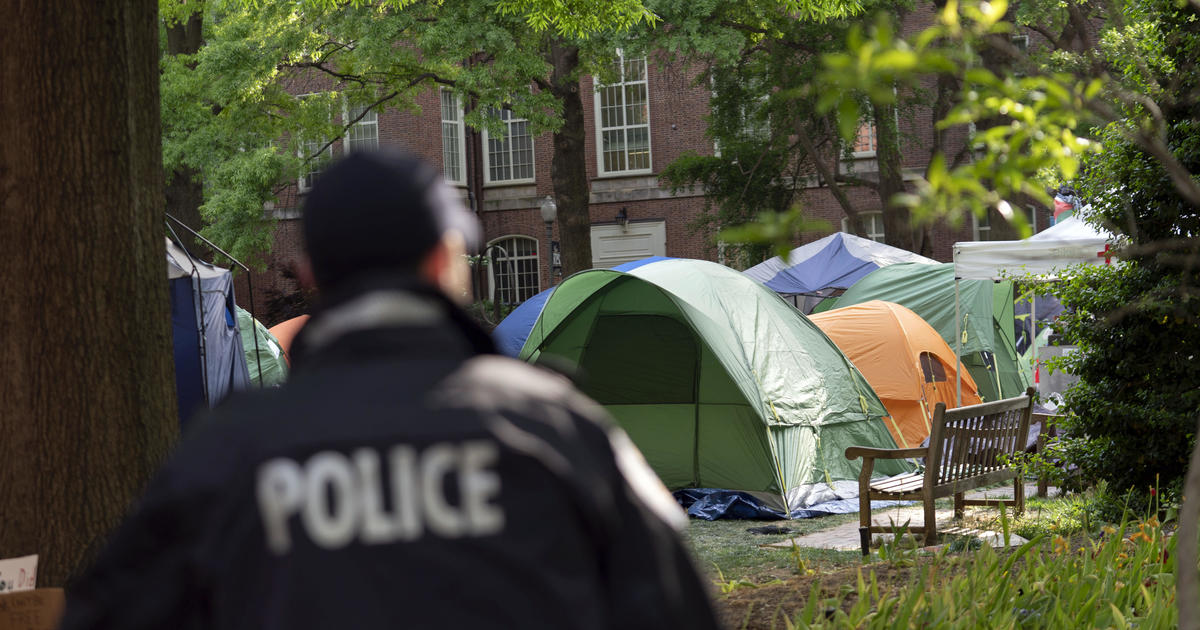Students protesting the Israel-Hamas war at universities across the U.S. dug in on Saturday and vowed to keep their demonstrations going despite ongoing clashes with law enforcement called to remove protesters.
Early Saturday, police began clearing out a Pro-Palestinian student encampment on the campus of Northeastern University in Boston. The school said the demonstration, which began two days ago, had become “infiltrated by professional organizers” with no affiliation to the school.
The school said in a statement that antisemitic slurs, including “Kill the Jews,” were used.
“We cannot tolerate this kind of hate on our campus,” said the statement, which was posted on the social media platform X.
CBS Boston
As the death toll mounts in the war in Gaza, protesters nationwide are demanding that schools cut financial ties to Israel and divest from companies they say are enabling the conflict.
Meanwhile, some Jewish students say the protests have veered into antisemitism and made them afraid to set foot on campus.
Students representing the Columbia University encampment, which inspired the wave of protests across the country, said Friday that they reached an impasse with administrators and intend to continue their protest.
The university’s senate passed a resolution Friday that created a task force to examine the administration’s leadership, which last week called in police in an attempt to clear the protest, resulting in scuffles and more than 100 arrests.
Though the university has repeatedly set and then pushed back deadlines for the removal of the encampment, the school sent an email to students Friday night saying that bringing back police “at this time” would be counterproductive.
The decisions to call in law enforcement, leading to hundreds of arrests nationwide, have prompted school faculty members at universities in California, Georgia and Texas to initiate or pass votes of no confidence in their leadership. They are largely symbolic rebukes, without the power to remove their presidents.
But the tensions pile pressure on school officials, who are already scrambling to resolve the protests as May graduation ceremonies near. The University of Southern California, which had already canceled its valedictorian’s speech, said it would not hold a graduation ceremony, citing safety concerns.
California State Polytechnic University, Humboldt, gave protestors who have barricaded themselves inside a building since Monday until 5 p.m. Friday to leave and “not be immediately arrested.” The deadline came and went. Only some of the protesters left, others doubled down. After protesters rebuffed police earlier in the week, the campus was closed for the rest of the semester.
Anthony Souffle/Star Tribune via Getty Images
In Colorado, police swept through an encampment Friday at Denver’s Auraria Campus, which hosts three universities and colleges, arresting around 40 protesters on trespassing charges.
Denver mayor Mike Johnston visited the campus on Friday night for a brief conversation with pro-Palestinian protestors who have occupied the lawn in front of the Tivoli Student Union. He was peppered with questions and taunts as he called for an end to the encampment.
“We are here to try to make sure we can help you all exercise to protest peacefully. We want this to be a campus where you can exercise your First Amendment rights and be respected to do that,” said Johnston. “We also have to have a campus that can continue to operate here so our ask is we need to you all to be able to pull down the tents. That is against campus policy. You can continue to protest peacefully once the tents come down.”
The protests have inspired students around the world.
In France, students at the Paris Institute of Political Studies, which counts President Emmanuel Macron among its many famous alumni, students blocked access to a campus building and classes went online as the wave of protests reached overseas.


